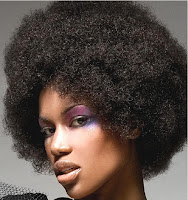Every month, at the Centquatre, in Paris, the journalist and activist Rokhaya Diallo animates an afternoon around an issue of topicality. Saturday, December 10, the conversation was about the black women's hair. In this afternoon, entitled "Black women and frizzy hair: why so much
hatred?" We saw a 56-minute documentary, Kickin 'it with the Kinks, by Cynthia Butare, a Rwandan-born Swiss-born filmmaker. Took advantage of his studies in Britain to interview British young people of African descent on this issue.
It goes without saying that controlling the appearance of her own hair is a vector for the emancipation of black women, faced with a colonial norm that has long imposed on them to smooth, lighten, store their hair under smooth squares, up to To cause in them some real physical suffering - the lightening products can attack the scalp, the irons to smooth cramer. Because the stakes surrounding a hair are much greater than one thinks. "Hair is hair - yet it deals with wider issues: self-acceptance, insecurity, and what the world sees as beautiful. For many black women, the idea of wearing their hair natural is unbearable, "wrote Nigerian novelist Chimamanda Ngozi Adichie in The Guardian in 2013.
In the preface to his book Afro! (Les Arènes, 2015), a beautiful series of portraits of French people of African ancestry who tell their complex relationship to a hair they carry today natural, Rokhaya Diallo recounts this anecdote: in 2013, A documentary in which she followed young Afro-Americans in full discovery of France. She said that her interlocutors were at first surprised to discover a leading French politician, Christiane Taubira, wearing braids. And one of them told the reporter who questioned her, "You imagine Michelle Obama with an afro?".
At the same time, the nappy movement, which advocates a return to the natural and recommends both women and men to dress as they want, arouses great interest, for reasons both aesthetic and political. As the designer of cosmetics brand Nappy Queen, Bilguissa Diallo, says in the book Afro! : "It is no coincidence that the nappy movement is emerging now. If we look at the political context, it comes at exactly the time when we, young blacks, stop asking permission to be there. "
